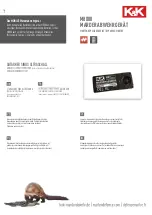
EVM User’s Guide
TI Confidential – Strictly Private
7
CC3200
P1
P3
Ref Signal
Dev
Pin#
Dev
Pin# Signal
1
3.3V
5V
2
ADC_CH1
58
GND
3
UART0_RX
4
57 ADC_CH0
4
UART0_TX
3
60 ADC_CH3
5
GPIO
61 58* ADC_CH1
6
ADC_CH2
59 59* ADC_CH2
7
SPI_CLK
5
63 AUD_SYNC
8
GPIO
62
53 AUD_CLK
9
I2C_SCL
1
64 AUD_DOUT
10 I2C_SDA
2
50 AUD_DIN
P4
P2
Signal
Dev
Pin#
Dev
Pin# Signal
Ref
PWM
2*
GND
1
PWM
1* 18 GPIO
2
PWM
17* 8 SPI_CS
3
PWM
64* 45 GPIO
4
CCAP/GPIO 21*
RESET_OUT 5
CCAP/GPIO 18* 7 SPI_DOUT
6
GPIO
62* 6 SPI_DIN
7
GPIO
60* 21 GPIO
8
GPIO
16 55 GPIO
9
GPIO
17 15 GPIO
10
The signal mappings are as per the table above. All the signals are referred by the pin-no in the
SDK and the table above shows the default mappings. Note that some of the pins are repeated
across the connector. For e.g. pin 62 is available on P1 and P4, but only P1 is connected by
default. The signal on P4 is marked with a *(star) to signify that is not connected by default. It
can be routed to the pin by using a 0 Ohm resistor in the path. Please refer to the schematics
and placement diagram for the exact resistor placement.
2.3 Power
The Launchpad is designed to work from the USB provided power supply as it
enumerates as a bus-powered device. Care has been taken in the design to ensure that
the board does not violate the in-rush limits of the USB bus. The board can also be
powered by an external 2xAA or 2xAAA battery which is connected on J20.
Summary of Contents for SimpleLink CC3200MOD
Page 8: ...EVM User s Guide TI Confidential Strictly Private 9 Figure 3 Layer 3 Figure 4 Bottom Layer...
Page 9: ...EVM User s Guide TI Confidential Strictly Private 10 2 5 Schematics...
Page 10: ...EVM User s Guide TI Confidential Strictly Private 11...
Page 11: ...EVM User s Guide TI Confidential Strictly Private 12...
Page 12: ...EVM User s Guide TI Confidential Strictly Private 13...
Page 13: ...EVM User s Guide TI Confidential Strictly Private 14...
Page 15: ...EVM User s Guide TI Confidential Strictly Private 16 2 7 Antenna information...





































